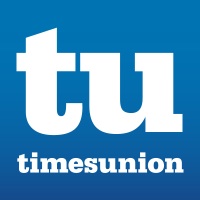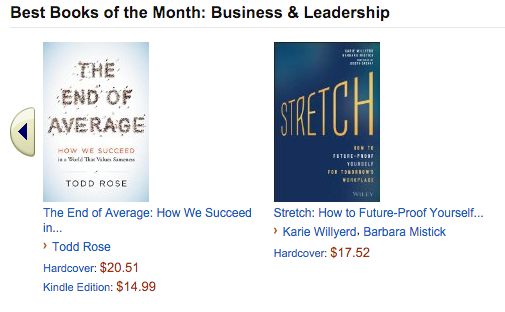
Review
Book Review: “Stretch” Shows How to Future-Proof Your Career
By Ivana Taylor
March 20, 2016
Summary
A powerful guide to the world of work heading toward 2020. Includes research, insights and specific how-to strategies for students, employees and business owners.
stretch book
Something really frightening happened to me the other day. I was exploring some of the new job sites out there like Indeed and FlexJobs when it hit me. It wasn’t like a ton of bricks, rather, it was a sort of sinking feeling. Honestly, I don’t even know why it mattered. I wasn’t looking for a job. But what if I was looking for a job? What if something happened and I needed to get back into the corporate world? I realized that my current skill set was so specific and so unique that they didn’t really match exactly what the hiring companies were looking for.
How to Future-Proof Your Career…
[read full article] | [source]
News
The Future Of Work: Three Simple Strategies For Keeping Your Edge At Work
By Leah Eichler
Friday, January 08, 2016
With unemployment hovering around 7 per cent these days, the rise of the robot apocalypse threatening jobs and the move toward a contingent work force, long-term job security feels more like a relic every year, something akin to dial-up modems or flash mobs.
So how do hard-working employees maintain their edge? Three experts weigh in on the habits you need to embrace to stay competitive and even get ahead at work.
1. Stretch yourself
While research out of Oxford University suggests that nearly half of all jobs are at risk of being replaced by technology, employees need to do more than bone up on their high-tech skills to stay ahead, explained Barbara Mistick, co-author of Stretch: How to Future-Proof Yourself for Tomorrow’s Workplace, which will be published in January.
“In many workplaces, there is pressure to do more with less. Changes in business models and the pressure to develop new skills have made us all feel like we have a looming sell-by date,” she said in an interview.
[read full article] | [source]
News
5 STEPS TO REBUILD YOUR CAREER CAPITAL THIS YEAR
IF YOU FEEL STUCK IN YOUR JOB, HERE’S HOW TO GET BACK IN THE GAME.
By Laura Vanderkam
January 8, 2016
Careers go through peaks and valleys, and sometimes life can push you into hunker-down mode. Maybe you’re caring for an aging parent or child, or dealing with a health issue. Maybe you had a horrible boss for a while, and all you cared about was self-preservation. At some point, though, the situation can change. If 2016 is the year you want to get back in the game, here are some steps that will help you rebuild your career capital, and move from the slow track into the fast one.
STEP 1: SET SMALL ACHIEVABLE GOALS
Small wins boost your confidence, and part of getting back in is believing that you can. “You could just do something as simple as say, ‘I want three new experiences,’” that would be professionally helpful, says Barbara Mistick, coauthor with Karie Willyerd of the new book Stretch: How to Future-Proof Yourself for Tomorrow’s Workplace. Maybe you set goals to give a speech, lead a project, and attend a conference. As you achieve these, you’ll know you’re making solid progress.

Review
Review: ‘Stretch’, by Karie Willyerd and Barbara Mistick
By Emma Jacobs
January 6, 2016
This is a book for anyone who has used the new year to take stock of their professional development and plan their next move. A point brought home to me personally with the opening anecdote about a washed-up journalist, who despite winning multiple Pulitzer prizes and reporting all over the world, failed to read the signs about social media and personal branding. He was sacked and found himself unmarketable.
What he needed, say the authors of this book, was “stretchpertise”: “the professional ability to creatively restructure and repurpose in order to adjust to changing environmental demands.” We all need to learn on the fly, the authors argue, to be open, create a network and gather diverse experiences. As Marshall Goldsmith, the executive coach, is quoted as saying: “What got you here won’t get you there.” The authors say the question is not whether you have a sell-by date. (You do.) Rather, it is how to extend the shelf life of your skills. After all, work is unpredictable and always changing because of emerging technologies, globalisation, short-term contracts and part-time work.

Review
Book Smart
By Elizabeth Floyd Mair
December 18, 2015
“Stretch: How to Future-proof Yourself for Tomorrow’s Workplace”
Karie Willyerd and Barbara Mistick, January 2016, Wiley, $26
Written for both managers and employees, “Stretch” shows how to prepare for an unknown future and avoid becoming obsolete. In collaboration with SAP and Oxford Economics, the authors conducted a massive global study of how changes in the global economy, technology and shifting demographics will influence work in the future. On the basis of their research, they detail how to, for instance, learn on the fly in any situation; cultivate a growth rather than a fixed mindset; connect to people who fill you with insights and power to thrive; and grab work opportunities that will develop your capabilities beyond where you are now.
[source]

Review
A New Yardstick for Leadership
by Stephanie Castellano
December 08, 2015
Stretch: How to Future-Proof Yourself for Tomorrow’s Workplace
Karie Willyerd and Barbara Mistick
Wiley, 240 pp., $26
Today college degrees become obsolete faster than graduates can pay off the loans they took out for them. Skills have a sell-by date, say Willyerd and Mistick, and it can sneak up on you sooner than you expect. Stretch gives the tools you need to extend your shelf-life as a skilled, value-adding employee. The book is organized around five central practices that will help you remain resilient, motivated, and attractive to employers. With real-world examples and useful, sometimes surprising tips, Stretch is a valuable read, no matter what stage you’re in in your career.
[source]

Review
Associations Now
October, 2015
If you’re waiting for your organization to train you to succeed in the unclear future of work, you’re at risk of losing control of both your career and your current job. On average, according to the Center for Creative Leadership, only 10 percent of learning comes from formal training. Thus, even the most talented workers can have a “sell-by date,” often one they don’t see coming, say authors Karie Willyerd and Barbara Mistick in their book Stretch: How to Future-Proof Yourself for Tomorrow’s Workplace.
Their research of 5,500 employees and executives in diverse industries confirms that the urgency for people to take charge of their own careers has never been greater. The question is how—and be specific, please.
Fortunately, the authors are. They start by sharing three Stretch Imperatives—it’s all on you, you need options, you have dreams—which they break into five Stretch Practices: “bouncing forward,” learning on the fly, building a diverse network, being “greedy about experiences,” and being open to the 70 percent of on-the-job learning that happens informally. Thirty strategies to execute these practices help you “stretch” steadily and measurably.
The strategies emerge from personal stories of research participants, along with supporting data from the authors’ studies and other trends, such as the rise of “unintentional de-skilling” and the growth of co-located workplaces.
Keep a pencil ready for the 30 Stretch Breaks of short self-assessments and reflection questions. Your answers build momentum for the Plan Your Future tool at the end. Not an optional assignment for any serious professional.
– AssociationsNow.com
[source]

Review
BizEd Magazine
Is your job becoming obsolete? Are you? Those unnerving questions are posed by Barbara Mistick, president of Wilson College, and Karie Willyerd, a workplace futurist with SAP. The authors identify megatrends that are transforming the workplace—including globalization, big data, technology, and demographic shifts—then lay out strategies designed to help anyone “stretch,” adapt to new realities, and stay employable. They suggest these practices: Learn on the fly; be open to new learning; build a diverse network to help you find the next job; be greedy about experiences; and bounce forward, even after setbacks. As they write, “Stretching is the future imperative for us all.”
– BizEd Magazine
November/December 2015

News
Stretch Yourself to Remain Relevant
by Karie Willyerd and Barbara Mistick
October 2015
In an extensive study conducted by researchers at Oxford University, 47 percent of U.S. jobs were classified as being at high risk for replacement with computerization or automation, and another 19 percent at medium risk. Whether software or hardware, computerization is going to affect jobs dramatically in the next decade—perhaps more than any decade in history.
In the study, high wages and educational attainment showed a strong negative relationship with the likelihood of being computerized. In other words, jobs that currently require having an advanced education resulting in high wages have a big bull’s-eye on them.
Review
Library Journal
Rapid advances in technology, global economic change, and record unemployment have fueled a concern about falling behind and becoming obsolete in the workplace. According to global research by coauthors Willyerd (coauthor, The 2020 Workplace) and Mistick (president, Wilson Coll.), the concern is widespread. The megatrends shaping tomorrow’s workplace will require new skill sets. This work outlines five key strategies to acquire the needed knowledge and connections; they can be summed up as: learn in any situation, maintain an open mindset, connect to people who can help your future, seek out experiences that will prepare you, and stay focused and motivated. Anecdotes, insights, and research-based conclusions highlight the practical relevance of each strategy and are entertainingly informative. The authors’ research was sponsored by Oxford Economics and SAP (Systems Applications Products) and includes their megatrend analysis as well. VERDICT Thoroughly researched, approachable, with wide general appeal; the authors provide actionable guidance to help the reader grow for the workplace of tomorrow while engaging them in the occupation they have today. Extensive notes and an annotated further reading are included.
– Jane Scott, Clark Lib., Univ. of Portland, OR

News
How to Get Feedback When No One Is Volunteering It
by Karie Willyerd and Barbara Mistick
AUGUST 14, 2015
You are probably not getting the feedback you want or need, according to our research conducted with SuccessFactors and Oxford Economics. Less than half of respondents in our 27 country survey say that their manager delivers well on providing feedback either formally during their performance reviews (49%) or informally on a regular basis (43%). It gets worse.
The higher you go in an organization and the more successful you become, the less likely it is that people will voluntarily offer you feedback. You will receive less of it in general, and it may be so diffused that it’s unrecognizable or unhelpful. As a result, the search for genuine feedback becomes more and more your own responsibility over the course of a career.
News
Are you ready for the future?
DO YOU WORRY about you or your employees stagnating? Karie Willyerd, a workplace futurist, and Costco member Barbara Mistick, president of Wilson College in Chambers burg, Pennsylvania, suggest that employers “need to help people get the tools they need to achieve their career goals.”
They offer the following tips to help keep all minds engaged.
Adopt a growth mindset. Don’t settle for the idea that our skills are fixed. True potential is unknowable because it is impossible to foresee what can be accomplished with years of passion, toil and training. Hire and promote the people who are improving year over year.
Give feedback to help others grow. Millennials—people under the age of 35— want feedback 50 percent more often than non-millennials. And many say the relationship with their manager is what keeps them engaged at work. Take the time to give the feedback necessary to create a learning moment.
Avoid reaching your sell-by date. Are you continuing to learn and stay abreast of your field? Your company may be doing well, but what about the bigger picture of the economy and your industry? Seek out a conference or industry event that can help you find out what innovations are emerging in the field.
Stay educated. Learning should never be over if you plan on competing in the future. Consider sponsoring lunchand-learn TED talk sessions or invite local college professors in to give short talks.
Get five to thrive. Find five people who inspire you and make you a better person. A Gallup poll says employees who have a best friend at work are the most engaged. Help facilitate friendships with social outings, such as summer picnics and holiday parties, to encourage loyalty to each other and the company. For more information, go to stretch partners.com.





